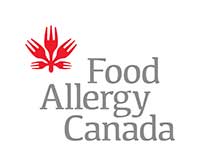Anaphylaxis Canada Initiates Name Change for Greater Outreach
 Big news hit the health world this week as Anaphylaxis Canada announced its decision to rename the organization Food Allergy Canada.
Big news hit the health world this week as Anaphylaxis Canada announced its decision to rename the organization Food Allergy Canada.
“It’s something that has evolved over the years,” explains Executive Director Laurie Harada. “At the beginning, people weren’t aware of anaphylaxis and part of the purpose of our organization was to increase that awareness.”
The organization was established in 2001 with a mission to inform, support, educate and advocate for the needs of individuals and families living with anaphylaxis, and to support and participate in research. It is mostly funded by donations, sponsorships and grants.
Now that most of the important stakeholders – medical professionals, schools, child care centres, government, food manufacturers and food service providers – are aware of the existence of life-threatening allergies, Harada feels the time has come to broaden the organization’s outreach.
“Anaphylaxis is a difficult word,” Harada says. “It’s hard to spell and to pronounce. But food allergy is a term that is familiar to everyone. We hope the name change will make our organization easier to find. As well, we will now be offering services in both English and French.”
Recent studies estimate that 1 in 13 Canadians is food allergic; the incidence in pre-school aged children is even higher. What that means is that about 2.5 million Canadians (15 million Americans) suffer from a food allergy. It’s estimated that only eight foods account for about 90 percent of all food allergies. These include peanuts, tree nuts, milk, eggs, gluten (wheat, rye, barley), soy, fish and shellfish. It is important for all food processors to ensure there is no chance of cross contamination through the various stages of the supply chain. In many countries, testing for the presence of specific food allergens at regular intervals is required.
The name change will not alter Food Allergy Canada’s core programs. Many of the organization’s services will continue to be offered for free, including online resources created to appeal to adults, teens and children, e-learning training courses, webinars for schools and day cares, and newsletters.
Food Allergy Canada will also continue to offer its food allergy safety program, Allergen Training Basics, to the food service industry. This program was developed in association with and is offered through TrainCan for a fee.
Food allergy safety practices must always be a key issue for the food service industry. And Food Allergy Canada will still be there to help.
About the Author
Lauren Solar is a freelance writer and editor who has multiple food allergies including anaphylaxis caused by shellfish and honey. She has been a writer and educator for various allergy and asthma patient education groups for over 30 years.
Interested in more articles like this? Visit GFSR’s web site today!

Categories: Trends in the Industry
Tags:



